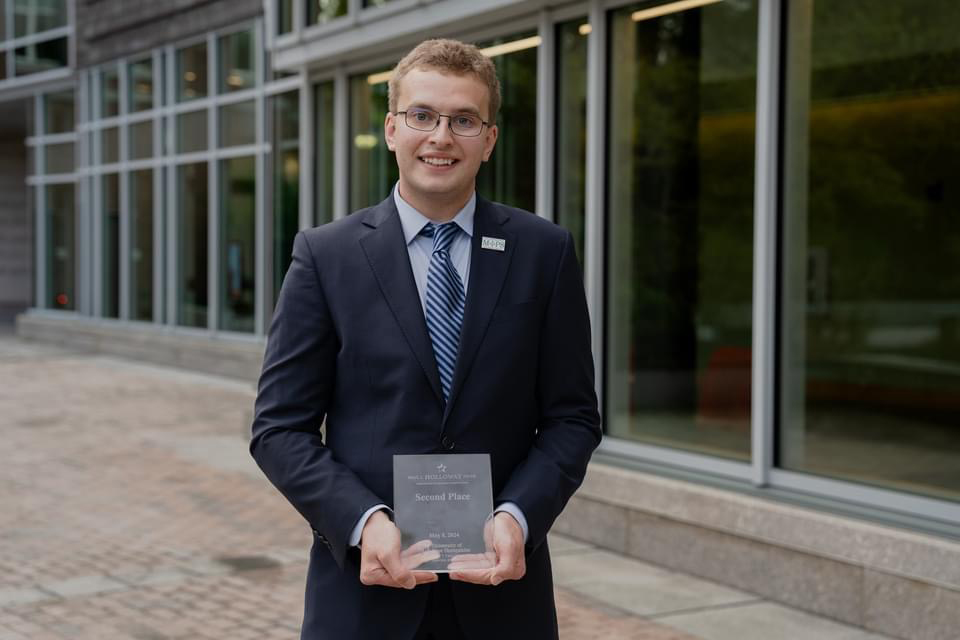Trim-Able Creator
Kyle Dimick

‘(Trim-Able) is not even just for people who have long-term disabilities,’ says Trim-Able creator Kyle Dimick. ‘A large percentage of my target customers are people who are older and have arthritis now. I could go a lot of different ways with this.’ (Courtesy photo) Kyle Dimick, a resident of Thornton, was recovering from a skiing accident at a physical therapy clinic in 2018 when he observed a patient visit the clinic to get his toenails trimmed. A physical therapist told Dimick it was a common situation for those having difficulty reaching down to trim their nails themselves, due to motor and muscular conditions.
Roughly 1 million U.S. children and adults have cerebral palsy, according to the Cerebral Palsy Alliance Research Foundation, a lifelong condition affecting movements like muscle coordination and control and balance. It’s caused by damage to the developing brain during pregnancy, during birth or shortly after.
The U.S. Office of Disease Prevention and Health Promotion reports that 54.4 million people, or 1 in 4 U.S. adults, report a diagnosis of arthritis. Statistics like these led Dimick to look for a solution to simplify nail trimming for people with such physical conditions.
After enrolling at Plymouth State University in 2021, Dimick found an opportunity to grow his idea, spending months with Bret Kulakovich, coordinator of PSU’s robotics automation program, to hone his creation.
From there, Dimick, now 22, founded Trim-Able, a startup for his accessible nail trimmer.
This interview was adapted from an interview for NH Business Review’s “Down to Business” podcast.
Q. Could you share a little bit about yourself and what your life is like now?
A. Growing up, I was always super into robotics and mechanics. I was the kid who took everything apart to see how it worked. My grandfather worked in a mill up north, so he has a bunch of random equipment I help him restore. He taught me how to do electrical stuff and how mechanical stuff works.
Q. You used the PSU makerspace with help from faculty to turn your product into a viable product. How was that experience?
A. Bret Kulakovich has been unbelievably helpful. We spent about five months on the first prototype. We got a chip from a software program called Dabble and put it into the prototype. That made it so you could put it on the floor, put your foot in it and use your phone to trim your nails. That’s perfect for people who have back issues or arthritis and can’t bend over.
Without the makerspace, I would still have a wooden prototype with no mechanics to it. It’s incredibly important to have those spaces, especially free and open to students. There are not many spots you can just walk in and mess around with multimillion-dollar pieces of equipment, and I don’t know of anywhere else like that in northern New Hampshire.
Q. With this product, you won awards at PSU’s Panther Pitch, and you also got second place in UNH’s Paul J. Holloway Prize Competition, where you earned $10,000 to secure a patent. Have you secured a patent yet?
A. I immediately put the money into it and have “patent pending” status now. I tried doing the provisional patent myself, and it took like a year and a half to figure out how to do it. For the nonprovisional patent, I hired a lawyer to do it the right way. It was a lot easier the second time.
Q. What are your next steps?
A. I need to continue with trademarking. I just filed for an LLC. The biggest thing is getting investors that feel it could work and take off. Then there’s getting the funds to do a startup run, beta testing, then full production. I’ve been looking into getting pharmacy stores like CVS, or online retailers like The Right Stuff and Advantage Medical, to sell this. I’ve also been looking at starting an online store.
I made it as rugged and as cost-effective as possible so that I can get the cost per unit down to $11-12 per trimmer. People I was talking to are spending about $40 per month to get their nails trimmed. I made it so that if people buy this product, they’re saving money after two-and-a-half months, because I’m selling it for $99.95 as of now.
Q. What support have you received?
A. The major helpers have been Bret from the makerspace, but then I worked with marketing professor George Pettinico to set up an independent study and make a marketing plan. I had Angela Watts, who partnered with Mark Cuban and Ashton Kutcher on “Shark” Tank for her company Fun Brands. And I’ve had Anthony Oglesby, founder of All Out Fitness and co-founder of Planet Fitness, and Peter Bauer, co-founder of Mimecast, reach out.